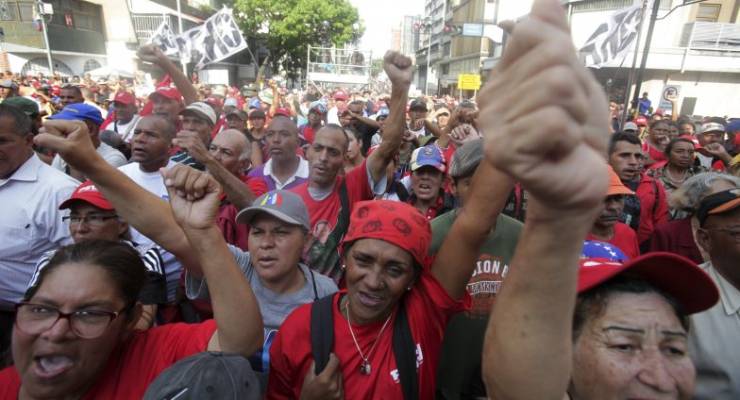
An attempted coup currently unfolding in Venezuela is a bleak reminder that the Latin American nation is grappling with a worsening humanitarian, socio-political and economic crisis, with opposition leaders out on the streets with armed soldiers calling for a military uprising.
Venezuela has been suffering from major food and medical shortages, and hyperinflation, which has led to the mass exodus of millions of Venezuelans over the past few years, looking for relief and refuge. The two leaders clashing over rightful leadership are sitting President Nicolas Maduro and opposition leader Juan Guaido.
In response to worsening conditions and Maduro ruling by decree, Guadió this year declared himself the interim president of the country. Guadió has the backing of 54 governments, including Trump’s government in the US, who view Maduro’s election win last year as unlawful.
Who are the players?
Nicolas Maduro is the sitting President of Venezuela and leader of the United Socialist Party of Venezuela. Maduro narrowly became president after winning a special election in 2013 with 50.62% of votes. The election was triggered by the death of his predecessor, Hugo Chavez. Maduro has since remained in charge of the country, after using decree powers in 2015, 2015 and 2016 to maintain his governance.
Juan Guaido is the president of the National Assembly of Venezuela and aligns with the social-democratic party The Popular Will. Guadió this year recognised himself as interim President of Venezuela. His party, The Popular Will, was formed in opposition to Maduro in 2014, and it played a key part in the 2014 Venezuelan protests. The group deemed Maduro “illegitimate” and “a murderer”.
What is the economic situation in Venezuela?
Venezuela has been crippled by exorbitant hyperinflation. It has the highest inflation rate in the world at 10,000,000% according to recent data by the International Monetary Fund. This has led to poverty and shortages of food and medicine.
Chavez, who preceded Maduro, used oil revenue to run the country when he was alive. Debt was accumulated, which Maduro inherited when he came to power, and the oil price crash of 2014 deteriorated the economy.
In order to tackle the dwindling economic situation, Maduro printed more money and introduced a new currency in 2015, the sovereign bolivar, which “knocks five zeros off the current system”, Maduro said at the time.
A new report published by US think-tank, the Centre for Economic and Policy Research, also reveals that US sanctions against Venezuela aimed at its oil industry, has contributed massively to the dire circumstances. The report by Columbia University’s Jeffrey Sachs, along with Mark Weisbrot, claims as many as 40,000 Venezuelans have died because of sanctions.
What is happening on the ground now?
Dr Raul Sanchez-Urribarri, a La Trobe University lecturer in legal studies with an emphasis on Latin America and Venezuela, said Guaidio has “acted in a way that was not anticipated by the government, by calling for a military uprising.”
Guaido is on the streets with a small group of defected soldiers near a military airbase in the city of Caracas, flanked by Popular Will party leader Leopoldo Lopez, who they liberated overnight from house arrest.
“For most Venezuelans to see this, it’s quite shocking in the sense that it is a major political event and that of course leaves us with the military side of things. How many people in the military are siding with Guaido? Not many from what we can tell (from current indications).”
Dr Sanchez-Urribarri said Maduro was also nowhere to be seen.
He said countries like the US and Venezuela’s neighbours were invested in Venezuela because the crisis “presents a formidable threat to stability in the region”.
“From a geopolitical perspective, three million, close to four million Venezuelans are refugees, forced migration, out of this horrific socio-economic crisis.
Dr Sanchez-Urribarri, who is Venezuelan himself, said the “living conditions the media accounts of daily life there…fall short. It’s really a dismal situation and the refugee crisis and political decline of the state capacity, and the growing role of criminal networks in the government…is decaying the state”








It would be great to hear from someone on the ground. This kind of puff piece is no different to what gets tossed out by the Nine papers.
Funny how years of harsh US sanctions haven’t had an impact in causing the so called ‘formidable threat to stability’.
Who and where are the millions who have left, perhaps it’s the previous dictatorial regime beneficiaries?
Where do war mongers US Bolton and US convicted criminal Abhrams fit in this story?
Let’s hope Max Blumenthal and others are on the ground.
Splendidly put, applet.
A atrocious piece of shilling.
Even Bolton has stated this is all about the ‘Monroe Doctrine’.
The Koch Brothers also have a dog in this fight – ‘heavy oil’ (as opposed to ‘light oil’, ‘sweet’, or not).
The Kochs have refining interests around the Gulf, and those refineries are tuned to heavy, not light, oil.
The US ‘fracking revolution’ produces light oil.
Venezuela’s oil is heavy. Nuff said.
Also, why is there no mention of the Poms deciding it’s legit to deny Venezuela access to the tons of gold they have stored in the Bank of England?
As for the 50 something countries who claim Maduro was elected ‘illegitimately’, and Gweedo is the rightful skipper, they really are either ignorant, or mere shills for Empire.
Venezuela is one of the pioneers of using fingerprinting to identify voters.
They have more audits, internal and by ‘international observers’, than any so-called ‘liberal Democracy’ in the West.
But, don’t take my word for it, try Jimmy Carter – as an international observer via his “Carter Group”;
“Of the 92 elections that we’ve monitored, I would say that the election process in Venezuela is the best in the world.”
And, yes, Maxie Blumenthal has written some splendid stuff from his recent time in Venezuela.
You might also like to try Abby Martin and Eva Bartlett for first hand accounts.
The author of this article would have been wise to wait a little while, rather than penning this ‘early crow’.
Since this was written, Maduro has been very front and centre, the Defense Minister likewise, the 25 odd ‘intelligence’ operatives seen with Gweedo have mostly bolted to either the Brazilian or Chilean embassy, and the Yanks are back to saying ‘all options are on the table’.
Another name worth chasing down, applet – Pepe Escobar – the best ‘foreign correspondent’ on the planet.
Bolton has been itching to invade somewhere for 20 years.
Well done for that primer David, there is far more than MSM will share with us on this coup attempt going on. I’ve found Max Blumenthal’s trip to the supermarkets of Caracas to show well-stocked shelves to be illustrative, as well as his and Ben Norton’s Moderate Rebels podcast, where they interview scholars and historians from the country and provide some background.
Maduro may not have played completely nice, but Guaido was next to unknown before he assumed the presidency after a tweet from Trump, only 20% of the country had heard of him.
If I talk to Columbians or Venezuelans who have fled the country they say “what do you know of our country, stop talking” but it seems those with the means to flee the country are looking for more of a capitalist economic system, rather than the Chavista model.
If you have Trump, Bolton, Elliot Abrams (convicted war criminal) and Rubio singing hard from the same song-sheet, pushing for the largest reserves of heavy crude oil in the world, and even a lot of establishment Dems, you can draw your own conclusions.
Yes, Matt, have seen Max’s and Ben’s Moderate Rebels, always check Grayzone during the ‘whip around’, and frequently catch Blumenthal on Vladvision (i.e. RT for the uninitiated).
Gained great respect for Blumenthal from reading “Goliath: Life and Loathing in Greater Israel” – brilliantly conceived and written.
His latest outing, “The Management of Savagery”, is currently en route to these digs.
Is Uncle Sam in there somewhere – besides Obama wanna-be Juan Guaido?
This piece was outdated by the time I had breakfast this morning. While NewCorpse and our ABC were waxing lyrical about the “coup underway”, overseas news services were already reporting that the coup had failed. For example here:
https://www.rt.com/news/458011-maduro-military-coup-defeated/
Leopoldo Lopez reportedly sought refuge in the Chilean embassy and 25 renegade soldiers supporting him sought similar in the Brazilian embassy:
https://www.rt.com/news/457985-venezuela-coup-fizzles-lopez-chile/
A local source, Brazil’s Folha de S.Paulo, reports that Lopez may already have fled Venezuela for Spain. See here:
https://aovivo.folha.uol.com.br/mundo/2019/04/30/5694-aovivo.shtml#post389434
Maduro addressed the nation Tuesday evening, announcing the defeat of the attempted coup.
And not a word on the $40,000,000,000 in gold held by the Yanks for Venezuela which the Yanks refused to return to Venezuela when requested to do so this year and thus have stolen it. I am so proud of my country for our acceptance of such theft, let alone all the useless and counter productive wars we have been involved with our ‘great and good allies’ all for the sake of a useless piece of paper and a promise that will never be fulfilled should we need it.
As mentioned in another comment, this is a puff piece. It is the sound of a reading from a script produced elsewhere, probably the State Department. It reminds me once again of all the foreign policy stuff ups by the Yanks post world war 2 and the servile acquiescence by similar lackeys and their political mouthpieces to them.
And while here, another point of interest, once again at the instigation of Uncle Sam, is the sounding of the war drums against Iran. By all non Western accounts the Iranians are getting very pissed off and have come to realise, like the Russians, that you cannot trust the Yanks and have the wherewithal to block the Straits of Hormuz should they be attacked. There goes the world economy if that happens.
And we still sing to their hymn sheet! Unbelievable.
No argument from me on this Rob.
The Yanks are just itching for another war to feed their military industrial complex.
Reminds me of Trump’s comments, or words to the effect, prior to the overthrow of Gadaffi. If they won’t sell us their oil then we will come and take it !
Are we looking at a similar scenario unfolding in Venezuela ?
John Menadue in his article in “Pearls and Irritations” — “Joined at the hip to a very dangerous ally that is almost always at war. An update”, sets out a very important and well presented overview.
As the US withheld $145B of Iran’s deposits in US banks since 1979 until Obama returned it (though not the interest that would have accrued) they’d signed the treaty which Trump recently repudiated.
Which the RWNJ – here as well as in the Benighted States – reported as “giving the Iranians $145B“.
Saddam’s fatal mistake was attempting to lodge Iraq’s oil revenues in euros instead of US dollars.
The above article is a very poor attempt to explain what is going on in Venezuela right now. Check out https://thegrayzone.com/ if you want some in-depth investigative journalism.